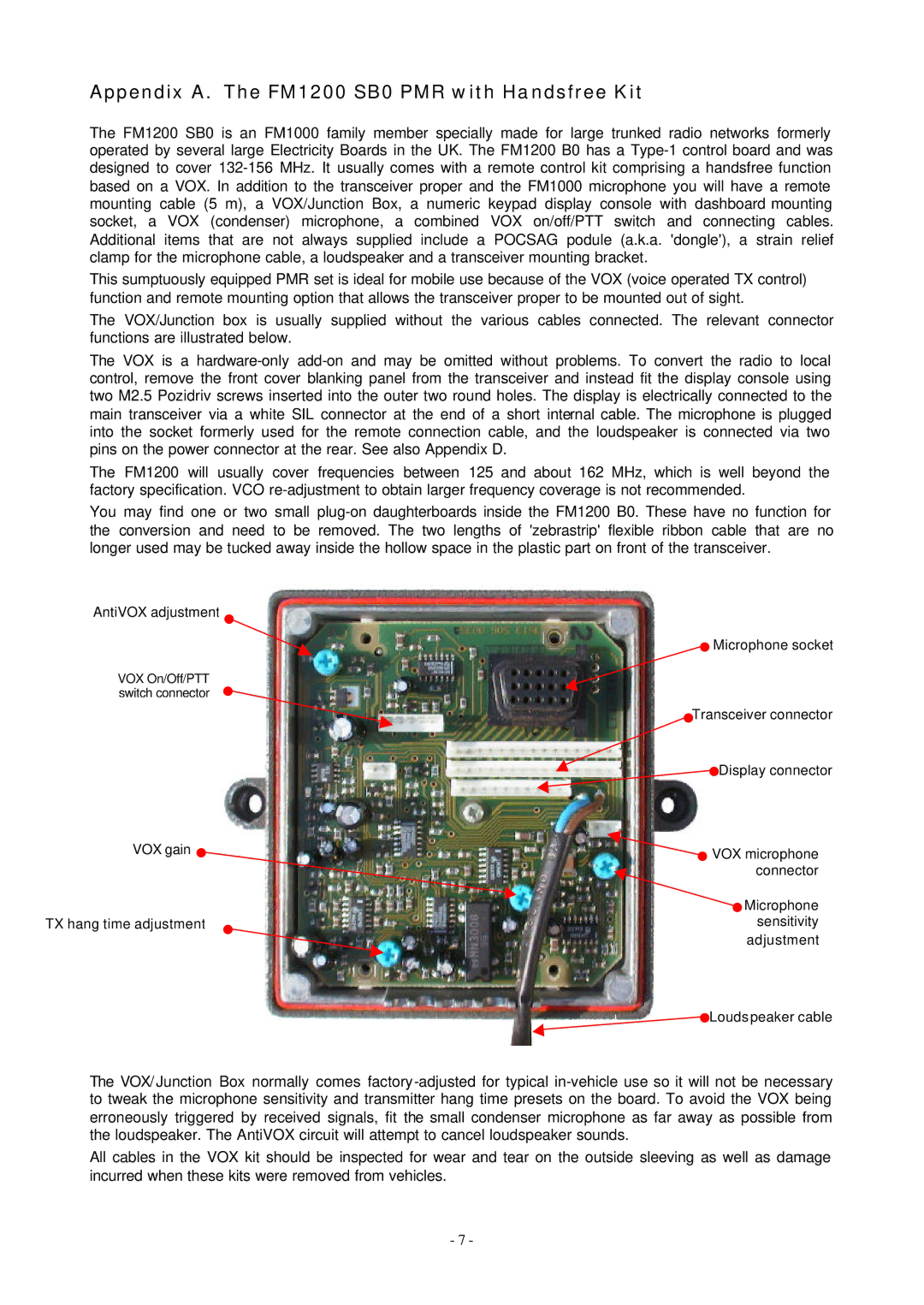Appendix A. The FM1200 SB0 PMR with Handsfree Kit
The FM1200 SB0 is an FM1000 family member specially made for large trunked radio networks formerly operated by several large Electricity Boards in the UK. The FM1200 B0 has a Type-1 control board and was designed to cover 132-156 MHz. It usually comes with a remote control kit comprising a handsfree function based on a VOX. In addition to the transceiver proper and the FM1000 microphone you will have a remote mounting cable (5 m), a VOX/Junction Box, a numeric keypad display console with dashboard mounting socket, a VOX (condenser) microphone, a combined VOX on/off/PTT switch and connecting cables. Additional items that are not always supplied include a POCSAG podule (a.k.a. 'dongle'), a strain relief clamp for the microphone cable, a loudspeaker and a transceiver mounting bracket.
This sumptuously equipped PMR set is ideal for mobile use because of the VOX (voice operated TX control) function and remote mounting option that allows the transceiver proper to be mounted out of sight.
The VOX/Junction box is usually supplied without the various cables connected. The relevant connector functions are illustrated below.
The VOX is a hardware-only add-on and may be omitted without problems. To convert the radio to local control, remove the front cover blanking panel from the transceiver and instead fit the display console using two M2.5 Pozidriv screws inserted into the outer two round holes. The display is electrically connected to the main transceiver via a white SIL connector at the end of a short internal cable. The microphone is plugged into the socket formerly used for the remote connection cable, and the loudspeaker is connected via two pins on the power connector at the rear. See also Appendix D.
The FM1200 will usually cover frequencies between 125 and about 162 MHz, which is well beyond the factory specification. VCO re-adjustment to obtain larger frequency coverage is not recommended.
You may find one or two small plug-on daughterboards inside the FM1200 B0. These have no function for the conversion and need to be removed. The two lengths of 'zebrastrip' flexible ribbon cable that are no longer used may be tucked away inside the hollow space in the plastic part on front of the transceiver.
AntiVOX adjustment
| | | | | | Microphone socket |
| | | | | | | |
| | VOX On/Off/PTT | | | | | |
| | switch connector | | | | | |
| | | | | Transceiver connector |
| | |
| | | | | | | |
| | | | | | | |
| | | | | | Display connector |
| | VOX gain | | | | | |
| | | | | | |
| | | | | VOX microphone | |
| | | | | | |
| | | | | | connector | |
| | | | | | | |
| | | | | | Microphone |
TX hang time adjustment | | | | sensitivity |
| | | | | | adjustment |
 Loudspeaker cable
Loudspeaker cable
The VOX/Junction Box normally comes factory-adjusted for typical in-vehicle use so it will not be necessary to tweak the microphone sensitivity and transmitter hang time presets on the board. To avoid the VOX being erroneously triggered by received signals, fit the small condenser microphone as far away as possible from the loudspeaker. The AntiVOX circuit will attempt to cancel loudspeaker sounds.
All cables in the VOX kit should be inspected for wear and tear on the outside sleeving as well as damage incurred when these kits were removed from vehicles.

![]() Loudspeaker cable
Loudspeaker cable